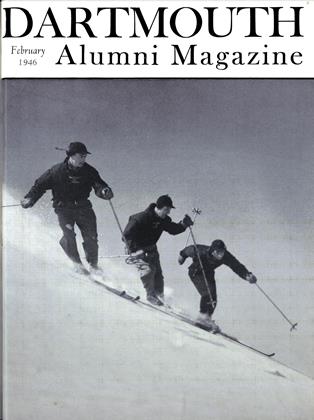FROM AN ARTICLE printed in a recent number of The New York Times Sunday Magazine one may reasonably infer that President Dodds of Princeton is not sold on the idea of perpetual streamlining for college curricula. It may be admitted that such an expedient, as applied to the liberal arts colleges, can be greatly overdone when the stress and strain of war relaxes. Mr. Dodds appears to be among those who regard any system which shortens appreciably the traditional four-year college course as a mistake, save in the face of an overmastering compulsion such as a war can bring—and in that case is something which should be abandoned as speedily as may be when the crisis is past, rather than be made a permanent educational policy.
This, be it remembered, is speaking for the many, and not for the few who could perhaps get from a two or three-year course as much good as the majority should get from a four-year course. Undoubtedly there are young men for whom the shorter course is feasible enough, but they are not many; and it is arguable that even these few would profit more from their college training if the speed were reduced so that more time could be devoted to the processes of digestion.
"Cramming" as an educational process has its uses, but only in an educational emergency. As a permanent feature o£ the collegiate program it would conceivably do more harm than good for American scholarship. The very word "scholar" derives from a Greek word originally connoting leisure. By the hurry-hurry process so popular during the war years it may be that a student can amass the number of points for the bachelor's degree in less than the traditional time. It may be that in some ways the student would profit by curtailing the period prior to professional study, or the engagement in gainful activity. But as a matter of the long view it is still doubtful that this quick-lunch system is as good for a man as more leisurely dining would be. One must gobble, perhaps, if one has but a minute or two to spare before catching a train—but are we so pressed for time as all that? The musicians have a phrase for it. Something like "Allegro—ma non troppo!"
 View Full Issue
View Full Issue
More From This Issue
-
 Article
ArticleAlumni Council Meets
February 1946 By SIDNEY C. HAYWARD -
 Article
ArticleThe Admissions Problem Grows With Every Mail
February 1946 By Robert C. Strong '24 -
 Class Notes
Class Notes1918
February 1946 By ERNEST H. EARLEY, DONALD L. BARR -
 Class Notes
Class Notes1917
February 1946 By MOTT D. BROWN, DONALD BROOKS -
 Article
ArticleDARTMOUTH SKI SCHOOL
February 1946 By STEPHEN J. BRADLEY '39 -
 Class Notes
Class Notes1919
February 1946 By J. KENNETH HUNTINGTON, MAX A. NORTON
P. S. M.
-
 Article
ArticleThe Realizing Sense
February 1943 By P. S. M. -
 Article
ArticleLooks a Fertile Field
February 1943 By P. S. M. -
 Article
ArticleMilitary Training
November 1944 By P. S. M. -
 Article
ArticleWorld Organization
May 1945 By P. S. M. -
 Article
ArticleWhat a Change!
November 1945 By P. S. M. -
 Article
ArticleThe Fourth Estate
May 1946 By P. S. M.







